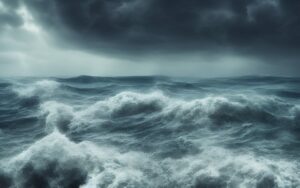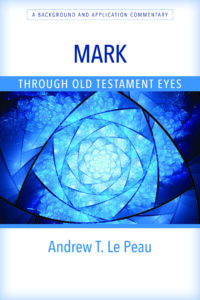Recently I was with friends for a relaxed visit. In the course of our wide-ranging conversations, the topic of what God has in store for humanity came up.
I mentioned that I took comfort that the book of Revelation says (in 21:1) that there will be no more sea. Why? Because it doesn’t mean that oceans will dry up. Rather because in the Bible the sea is often considered the source of chaos, disorder, and evil, Revelation is saying there will be no more evil. Indeed, just a few verses later Revelation (in 21:4) interprets itself by referencing Isaiah 25:8 to make this exact point:
“He will wipe every tear from their eyes. There will be no more death” or mourning or crying or pain, for the old order of things has passed away.
 My friends were somewhat surprised at this. They thought the text said what it meant. No more oceans.
My friends were somewhat surprised at this. They thought the text said what it meant. No more oceans.
Where did I get this idea about the sea?
Regarding Mark 4:35-41 where Jesus, in the boat with the frightened disciples calms the sea, I wrote in Mark Through Old Testament Eyes (p. 101):
The sea is often the place associated with evil and chaos in the Jewish mind. Apocalyptic literature is especially full of these resonances. In Isaiah 27:1 we read, “In that day, the Lord will punish with his sword—his fierce, great and powerful sword—Leviathan the gliding serpent, Leviathan the coiling ser¬pent; he will slay the monster of the sea.” And Daniel 7:2-3 says, “Daniel said: ‘In my vision at night I looked, and there before me were the four winds of heaven churning up the great sea. Four great beasts, each different from the others, came up out of the sea’ ” (see also Ps 89:9-10).
The book of Revelation picks up this very image in chapter 13 in which a blasphemous evil beast emerges from the sea to oppose God and his people. Later Babylon’s judgment is symbolized by a millstone thrown into the sea (Rev 18:21), appropriately sending evil back into the source of the forces of chaos.
One reason Jonah encourages his shipmates to throw him into the sea is that Jonah knows the sea, being a source of chaos and evil, is the appropriate place of judgment for someone like him who has disobeyed God.
 Other places in the gospel of Mark show this same understanding of the sea. It is where the demon-infested pigs rush (Mk 5:13), and it is where those who cause little ones to stumble are sent (Mk 9:24).
Other places in the gospel of Mark show this same understanding of the sea. It is where the demon-infested pigs rush (Mk 5:13), and it is where those who cause little ones to stumble are sent (Mk 9:24).
Part of the problem my friends had was a failure to see the category of writing the Old Testament prophets were using and how that affected their use of language–as well as when those in the New Testament borrowed their language. The prophets intentionally used the genre of apocalyptic literature which meant using dramatic symbols to make dramatic points.
Why is that important to know? Because the goal of reading the Bible is not to interpret it literally. The goal is to interpret it correctly.
Next post: How to read the genre of apocalyptic literature in Scripture, and what we should keep in mind to interpret it correctly.

My ignorance ends at this post. Thanks Andy! I appreciated all the different references you highlighted. In one fell swoop, you illuminated several spots in the Bible for me.